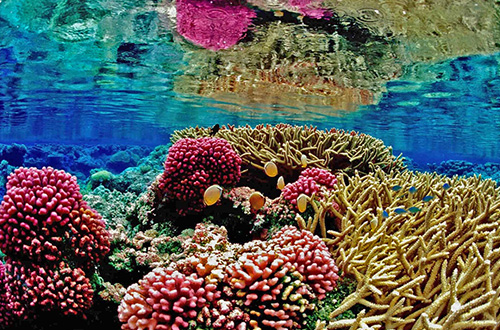Nusa Dua (Greeners) – Nearly 90 percent of world’s coral reefs would be gone by 2050 which poses threats for millions of people in developing countries.
To prevent the disastrous event, philanthropic organization, government, nongovernmental organization, scientists, conservationists launched a global plan to save coral reefs from climate change, pollution and bad fishing practices.
The movement, dubbed as 50Reefs, was launched at the second day of The Economist : World Ocean Summit 2017, in Bali, on Friday (24/2).
Professor Ove Hoegh-Guldberf of University of Queensland said that the movement would be the first global plan to save the most vulnerable biodiversity ecosystem in the planet.
“Coral reefs criteria for 50Reefs will be announced by the end of this year,” said Prof Hoegh-Guldberf. “In the future, the movement will increase awareness on climate change impacts to oceans. Eventually, we would come up with investment strategy needed to protect coral reefs.”
READ ALSO: Less Fish Catch Increases Food Security
Furthermore, he said that climate change impacts on coral reefs can be seen through massive bleaching resulted from increasing sea temperature.
Scientists predict that coral reefs ecosystem could be vanished in 30 years, which included the loss of thousands of fishes and other important organisms.
The loss of coral reefs will eventually pose threat to humans, especially livelihoods related to marine and fisheries.
Over-fishing, coastal development and pollution also threatening coral reefs. In several places, the ecosystem was already completely destroyed. In addition, climate change put more burden on the destruction but now was placed as the number one threat for coral reefs.
“Coral reefs are important but without us knowing, they are struggling to fight against extinction,” he said.
READ ALSO: UNEA-2 Supports Indonesia’s Sustainable Coral Reef Management
Michael R. Bloomberg, UN Special Envoy for Cities and Climate Change, in a recorded message, said that people was starting to think about climate change, they think about extreme heat, storms, and forest fires. However, not much people know or even care about the impacts on oceans.
“It happens because we couldn’t see the impacts in the lands. But, without coral reefs, we would lose a quarter of world’s biodiversity and hundreds of millions poor people will lose their source of food and livelihood,” said Bloomberg.
Based on new report from World Wide Fund For Nature (WWF) 2015, coral reefs hold conservative value of one trillion dollar which generates at least 300-400 billion dollars per year in food and livelihood from tourism, fisheries and medicines.
The 50Reefs is initiated by The Ocean Agency and Global Change Institute of University of Queenslands and collaborating with Google and XL Catlin, which conducted a comprehensive global survey on coral reefs and bleaching.
The survey was the subject of a documentary, Chasing Coral, which was the winner of Audience Award at Sundance Film Festival 2017. The documentary soon to be released at Netflix.
Reports by Danny Kosasih



















































